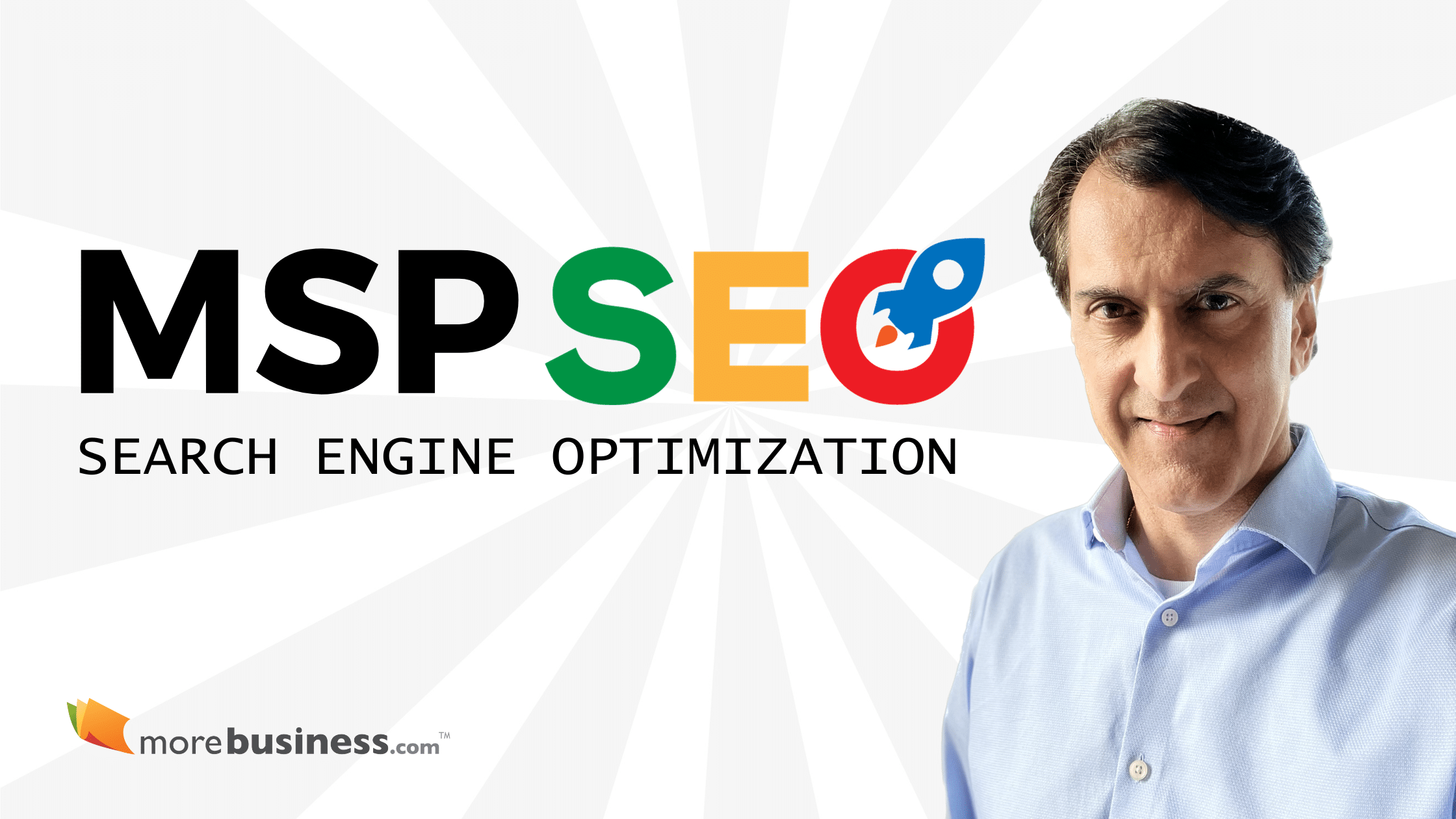MSP Search Engine Optimization (SEO) is the least expensive form of marketing to grow your managed service provider business. Pay per click ads can provide temporary lead flow, but it shuts off once you stop paying for ads. If you redirect the same investment into MSP SEO, you can generate an ever-flowing stream of qualified leads.
That’s because there is a constant stream of prospects who search Google daily for “buying intent” terms. When you create content that gets you ranked on page 1 of Google, you will attract these prospects without paying for any ads.
If you’d like a detailed proposal on our MSP SEO Agency service, fill out this form:
This MSP Search Engine Optimization Playbook will show you what you must do to tap into this daily pool of prospects. When you are ready for more, attend my MSP SEO Crash Course, which includes MSP keywords, content outlines, and ethical ways to use AI. It’s what I share as an SEO Coach to many companies.
Table of Contents
1. MSP Search Engine Optimization
Why SEO Matters for MSPs
- Visibility in a Competitive Market: In a field crowded with numerous managed service providers, standing out is crucial. Smart SEO ensures that you appear prominently in search results and attract more website traffic and, ultimately, more clients.
- Building Credibility and Trust: A strong online presence, bolstered by both content and technical SEO, enhances your credibility. When you appear on page 1 of Google for relevant terms, your prospects will view you as an authoritative resource.
- Long-Term Cost-Effective Marketing: Unlike paid advertising, the effects of SEO are long-lasting. Investing in SEO can provide a sustainable and cost-effective way to attract new business over time. The return on investment is massive.
 The Weekly SEO Coach Connection
The Weekly SEO Coach Connection
Before we go to far, I would like to invite you to subscribe to my free bi-weekly LinkedIn newsletter, The SEO Coach. You’ll get practical SEO tips tailored for MSPs – all based on real-world tests and trends, including using AI.
Subscribe: MSP SEO Coach Newsletter →
Now, let’s start and learn the SEO for MSP strategies that will boost your online presence.
Setting the Stage for SEO Success
SEO is not a one-time effort but a continuous process. You need to adjust to algorithm changes and provide useful content on your prospect’s buyer journey.
The starting point for MSP SEO is to map relevant keywords to your prospect’s buyer journey. Once you’ve done that, the next step is to create, tag and promote your new content on your website and through social channels.
2. Understanding the Basics of SEO for MSPs
Laying the Foundation for MSP SEO Success
As a former CEO of three B2B tech companies, I’ve seen firsthand the transformative power of SEO. I used it to scale my businesses quickly, eventually selling them to public companies in 7- and 8-figure exits. Once you tap into the power of Google, you can create a honeypot for leads to come your way.
Key SEO Principles for MSPs
- Identifying Your Target Audience: It’s tempting to serve all kinds of businesses. Pick a niche. The tighter your focus, the more clear your messaging will be.
- Use Your Audience’s Words: Doctors have patients, nonprofits have donors, accountants have clients. All are customers yet each market uses different words. Your content should incorporate words that resonate with your audience.
- Keyword Research: This is where you identify what potential clients type into search engines. For an MSP, relevant keywords might include ‘cloud computing services,’ ‘IT support for small businesses,’ or ‘cybersecurity solutions.’ MSP search engine optimization is not just about high-traffic keywords. Niche terms like ‘remote IT support for healthcare’ can attract more targeted, high-value traffic.
- On-Page and Off-Page SEO: On-page SEO involves optimizing your website’s content and structure. Let’s say a target keyword is ‘data backup solutions for energy companies’. You should include this phrase in the article’s title, heading, and throughout the content. Off-page SEO, like building backlinks, could involve guest posting on a tech blog with a link back to your site.
The Role of Keyword Research in MSP SEO
- Understanding User Intent: It’s vital to align your content with what your audience is searching for. When someone enters ’emergency IT support’ into Google, they likely need immediate assistance. That means your content should address quick response services.
- Long-Tail Keywords: Long-tail in SEO refers to phrases that are much longer than the root keyword. These terms are specific and get less search volume, but they are also far less competitive and easier to rank on. An MSP might target ‘affordable data storage solutions in Washington DC’ to attract local businesses.
Importance of On-Page and Off-Page SEO Strategies
- Optimizing Your Website: Let’s say you offer ‘network security services.’ You should post a dedicated page on this rather than simply listing it on an ‘Our Services’ page. Adding a dedicated page for each service gives you an opportunity to add related terms to each page.
- Building a Strong Backlink Profile: Backlinks are inbound links from other reputable sites that link a keyword to your site. When you create in-depth content, you automatically start building inbound links. You can also write guest posts for other sites to increase your backlinks. Example: for your Chamber of Commerce, write a guide on ‘best practices for remote IT management’ which has a link to your service page.
Effective SEO is about connecting with your audience through relevant, valuable content and a well-structured website.
3. Advanced Keyword Strategies for MSP SEO
Refining Your Keyword Approach for Maximum Impact
In my experience working with various MSPs, I’ve seen the remarkable difference a well-crafted keyword strategy can make. Let me share some advanced techniques that have proven effective in elevating MSPs’ online presence.
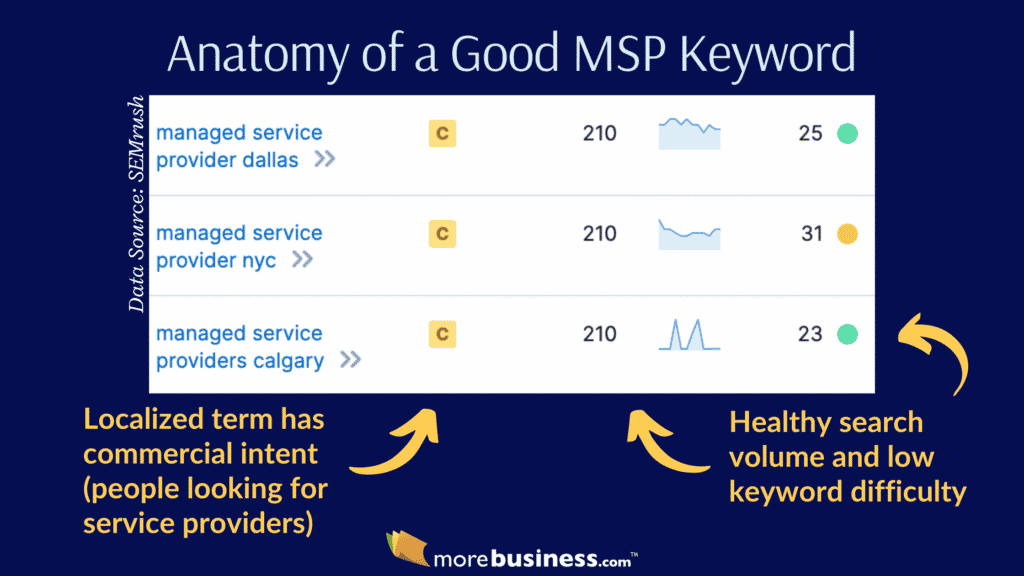
Identifying and Targeting Niche-Specific Keywords
- Case Study Example: I once worked with an MSP specializing in cybersecurity for small businesses. We focused on keywords like ‘small business cybersecurity solutions’ and ‘affordable cybersecurity services for SMEs.’ This targeted approach helped them rank higher for their specific niche, attracting more qualified leads.
- Utilizing Industry Jargon: Understand the language your clients use. If you provide VoIP services, write content using terms like ‘VoIP for remote teams’ or ‘business VoIP service providers’.
Including Long-Tail Keywords for Better Targeting
- Client Scenario: A client providing cloud services for healthcare organizations wasn’t ranking well. We shifted focus to long-tail keywords like ‘HIPAA compliant cloud storage providers.’ This not only improved their search rankings but also brought in more relevant traffic.
- Balancing Keyword Difficulty and Search Volume: Identifying an ideal keyword is about finding the sweet spot. For example, ‘managed IT services in Washington DC’ might be less competitive than ‘managed IT services’. This alternative phrasing offers you a better chance to rank higher.
Analyzing Competitors’ Keyword Strategies
- Competitive Analysis: Your competitors may have implemented MSP SEO. Leverage their work by using Semrush to sort their ranked terms by difficulty and search volume. This is an easy way to find new keywords. An MSP client use this SEO strategy to discovered untapped keywords like ‘enterprise IT support services’.
In my SEO Coach newsletter, I describe the exact process I used to increase top 10 rankings using this tactic. You can read the full case study here:
Detailed Competitive Analysis SEO Strategy →
These advanced keyword strategies have worked wonders for my MSP SEO clients. Remember, the key is to be specific, relevant, and always in tune with your target audience’s needs. As we move forward, we’ll explore how to effectively integrate these keywords into your content and overall SEO strategy.
4. Content Marketing: A Pillar of MSP SEO
In my experience working with MSPs, I’ve found that a ‘content waterfall’ approach can be incredibly effective. This strategy starts with a single, rich source of information and cascades into a variety of content forms. I’ll guide you through this process, which has significantly boosted both SEO and audience engagement for MSPs.
Building a Content Waterfall with Expert Discussions
- Recording Conversations with Subject Matter Experts: Schedule a discussion with an expert, often the CEO or a technical lead. For example, a conversation about ’emerging cybersecurity threats’ can be a goldmine of information.
- Involving Support Team Members: For broader perspectives in your content, you can include insights from those on the front lines, like support team members. They can add real-life examples from your customers to the discussion, which amplifies your content.
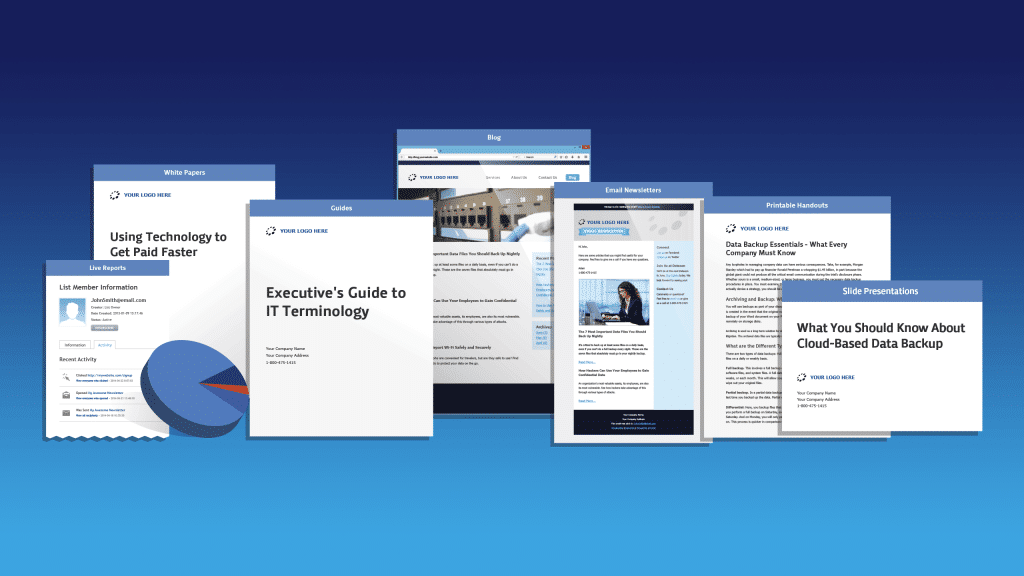
Creating a Cascade of Derivative Content
- Podcasts: You can turn the recorded conversation into a podcast episode. This format is excellent for audiences who prefer audio and adds a personal touch to your content.
- Video Clips for Social Media: Extract engaging snippets from the conversation and create short video clips. Share these video clips on platforms like LinkedIn, Youtube Shorts, or Twitter to offer bite-sized insights to grow your follower base.
- Content Clusters in an Article Series: Use the transcript from your recordings to create a series of articles. When you create multiple articles on a related topic, you form a content cluster. These clusters send Google a stronger signal about your site’s overall theme. It positions your MSP as a subject matter authority for SEO.
Integrating Traditional Content Strategies
- Educational Guides: The content waterfall leads to guides like ‘how to choose the right MSP for your business’ that you publish as a guide. This serves as a lead magnet for prospects to download from your site or to use with sales calls. You can create guides on numerous topics.
- Case Studies: Share success stories and client testimonials. For instance, a case study on ‘enhancing productivity through managed IT services’ can showcase your expertise and success.
- Visual Content: A well-made infographic summarizing a IT solution provides a beautiful visual for your articles and guides. Add an ALT IMG tag that relates to your target keyword to enhance the MSP search engine optimization of each article.
This content waterfall strategy combines traditional content marketing methods to create powerful SEO and lead magnets for MSPs. Your expert-led discussions create other content to reach a wider audience and strengthen your online presence.
5. Local SEO Tactics for Managed Service Providers
Local SEO is important in MSP search engine optimization because your clients are usually driving distance from you. Let’s get into local SEO strategies.
Optimizing Google Business Profile
- Claim Your Google Business Profile (GBP): If you haven’t already done so, visit google.com/business and claim your profile. Just follow Google’s steps, which may include requesting a postcard with a code to verify your address. Once you have claimed your profile, you can update it to attract leads.
- Comprehensive Profile Management: Include a description of your services and contact details along with keywords about your MSP services. Google uses these terms to make sure you provide what someone is searching on when they look for companies like yours on Google Maps. Highlight unique aspects of your MSP, such as ’24/7 support’ or ‘data backup and recovery.’
- Engaging Posts on Google Business Profile: Regularly post updates about your services, special offers, or events. For instance, when you publish a piece about setting up an office network, create a post for GBP with a link to your article. This showcases your expertise and keeps your profile active and engaging.
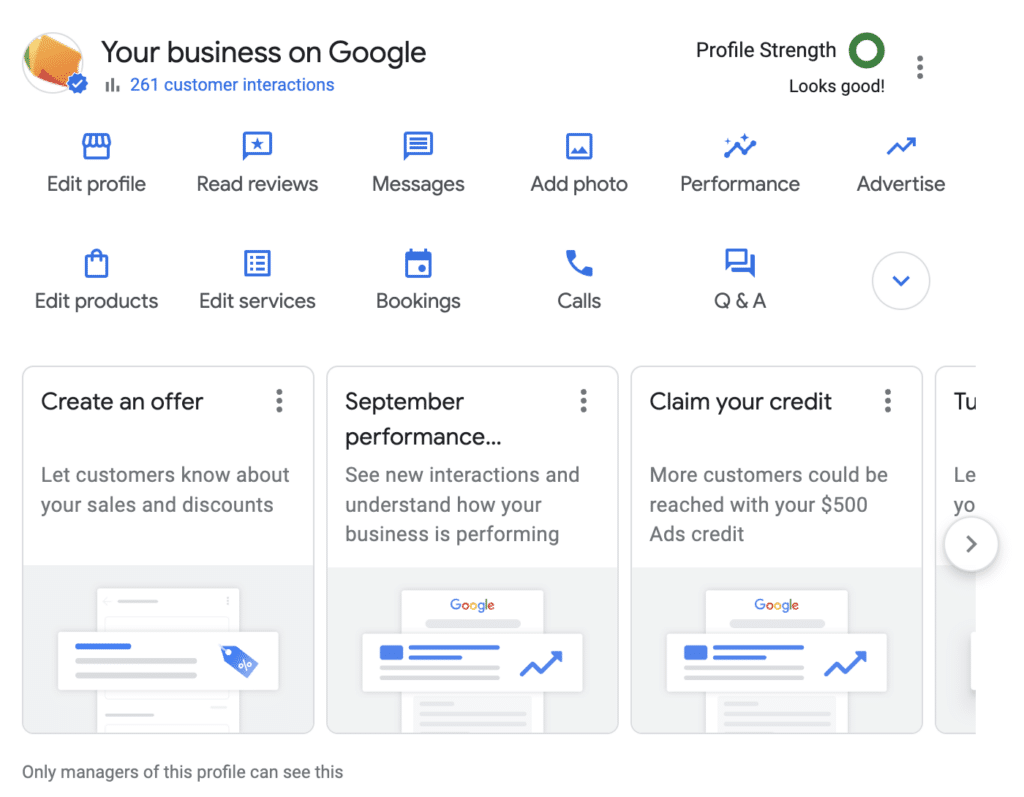
Showcasing Community Involvement
- Highlighting Local Events and Sponsorships: Share posts about your participation in local tech fairs, community events, or sponsorships. For example, if your MSP sponsors a local hackathon, publish a post about the event and your involvement. If you recently spoke at an event about network setup errors, post a picture and a short write up of your talk. These posts add local signals for Google.
- Volunteering Initiatives: If your team volunteers for a local charity or community project, share a post about the experience. This not only demonstrates community spirit but also humanizes your brand.
Creating Localized Content
- Blogs on Local IT Challenges: Write about specific IT challenges faced by local businesses. An article about ‘disaster recovery solutions for [Your City] businesses’ can be helpful for cities that get frequent storms.
- Local Success Stories: Share detailed case studies of how you’ve helped local businesses overcome specific IT challenges. This not only provides social proof but also helps with local keyword optimization.
Leveraging Local Reviews
- Active Review Management: Encourage satisfied clients to leave reviews on your Google Business Profile. Respond to these reviews, showing appreciation and engagement. This not only boosts your local SEO but also demonstrates your commitment to customer satisfaction.
A well-managed Google Business Profile that emphasizes community engagement can significantly enhance your visibility and appeal to local businesses. This adds to your “Google Signal” and helps position your MSP as the go-to expert in your geographical region.
Get the MSP SEO Crash Course
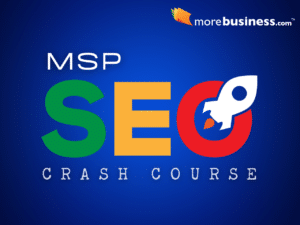 My goal is to translate proven tactics into actionable steps specifically for MSPs. It takes more than one article or guide to provide the insights and tactics that will get you on your way to top rankings. That’s why I’ve created the only course designed for companies like your, MSPs, to get traction fast.
My goal is to translate proven tactics into actionable steps specifically for MSPs. It takes more than one article or guide to provide the insights and tactics that will get you on your way to top rankings. That’s why I’ve created the only course designed for companies like your, MSPs, to get traction fast.
The best part: you’ll also get downloads to make your SEO efforts a lot easier, saving you weeks of painstaking work:
- Over 100 well-researched MSP keywords and content clusters
- Outlines to create content simply by talking and answering carefully worded questions (no writing)
- MSP buyer persona examples to help you build niche content – plus AI prompts to create personas for any niche
- Detailed prompts to turn audio into articles using AI tools like ChatGPT
- The technology stack I personally use (and pay for) that enables you to do all the work in a fraction of the time
Get the MSP SEO Crash Course →
I meticulously designed this course for the unique needs of MSPs. It includes practical, easy-to-implement strategies that don’t require you to be an SEO expert.
The course also includes real-life examples and case studies, making the learning process relatable and applicable.
By the end of the MSP SEO Crash Course, you’ll have a clear action plan to drive more qualified leads and grow your MSP business online.
I’ll take all the risk in your satisfaction with my personal 100% money back guarantee. If you feel the course doesn’t live up to its promise, just let me know (reply to the order form email) and I will give you a full refund.
 Author: Raj Khera is a former 3x CEO, MSP SEO course author, and publisher of MoreBusiness.com
Author: Raj Khera is a former 3x CEO, MSP SEO course author, and publisher of MoreBusiness.com

